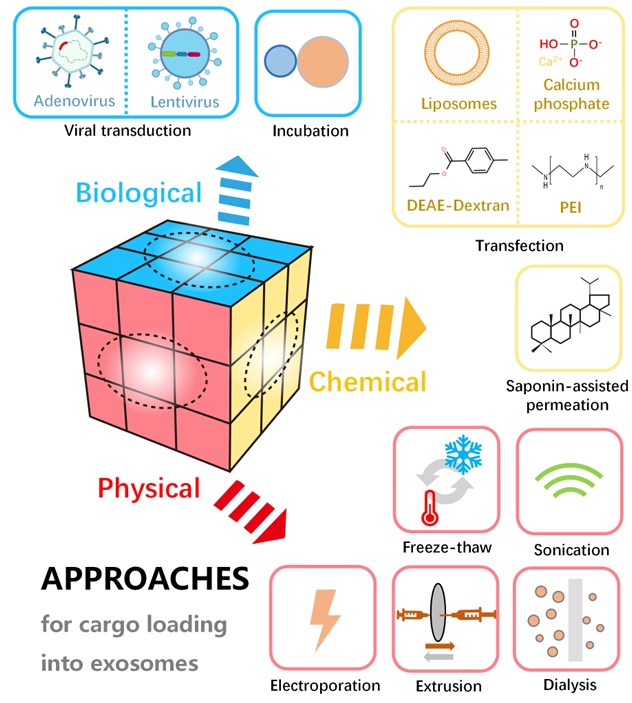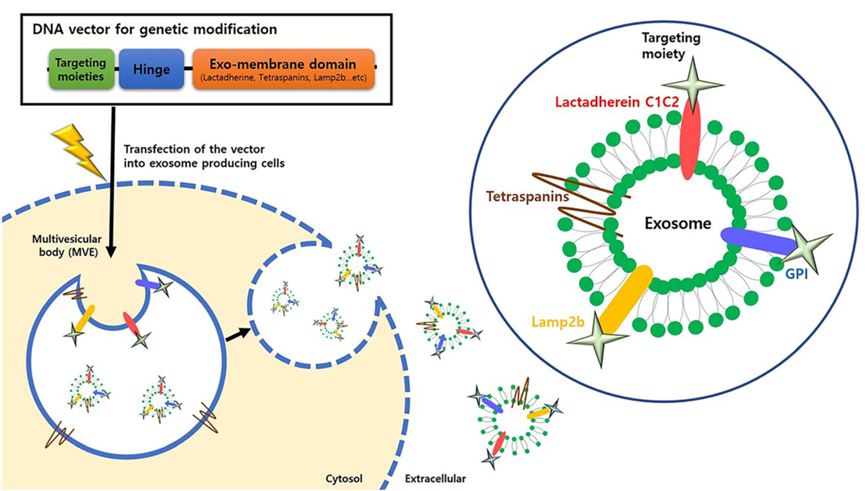Kidney-Targeted Exosome Modification Service
Overview Services Features FAQs
Based on years of experience in tissue-targeted modification and engineering of exosomes, Creative Biolabs' specialist team has the flexibility to adapt customized exosome modification protocols to customer requirements and provide research services related to exosome modifications targeting the kidney.
Overview of Exosome Targeted Delivery
Exosomes are involved in communication processes not only between cells and cells but also between cells and distant organs, which have been recognized as important carriers of substance transfer and signaling. There are various types of lipid and protein components on the spherical structure of the exosomes' bilayer that originate from their parent cells and play a key role in their translocation to their final settlement sites. Several studies have shown that these cell adhesion-related molecules and ligands inherently present on exosomes can bind to certain types of receptor organs/cells, as evidence that exosomes can inherit signal-targeted delivery cargoes from their parent cells.
In the application of drug delivery platforms targeting the kidney, it is desired to enrich the cargo more accurately to the target organ, the kidney, with highly engineered modification of exosomes as compared to the random distribution in other organs. Based on the kidney-specific or high concentration of molecules involved in metabolic, endocrine, and other physiological processes in the kidney, the use of kidney-specific enzymes, such as L-amino acid decarboxylase, N-acetyltransferase, and phosphodiesterase, has been found to enable the localized release of chemically modified amino acid precursor drugs in the kidney. Similarly, based on the retention of folate by kidney-containing high-affinity folate-binding proteins, folate conjugates are also known to be highly kidney-selective, which provides new ideas for kidney-targeted drug studies.
 Fig. 1 Schematic diagram of various approaches for cargo loading into or onto exosomes.1
Fig. 1 Schematic diagram of various approaches for cargo loading into or onto exosomes.1
Exosome Modifications Targeting the Kidney at Creative Biolabs
The key to efficient targeted delivery of genes and drugs to the kidney lies in the suitable selection of vector types. Compared to other vectors, exosomes utilize a combination of biomolecular delivery and nanomaterials engineering to carry parent cell-derived molecules on their surface, making it easier to overcome various biological barriers and reducing safety risks.
Creative Biolabs is committed to developing suitable methods to prepare exosomes for delivery to desired tissues and organs, including the appropriate selection of exosome sources, modification, and engineering of exosomes.
-
Exosomes derived from renal tubular epithelial cells have a higher tropism for the kidney based on an autocrine approach compared to other tissue sources.
-
Urinary-derived exosomes carry paracrine miRNAs that regulate renal tubular transport proteins, suggesting that urinary-derived exosomes may have renal targeting potential due to their involvement in renal metabolism.
-
The kidney has unique transport and metabolic conditions that are conducive to exosome-mediated renal targeting. As the understanding of renal structure and function improves, screening for more appropriate renal-targeting peptide modifications to exosomes allows for the targeted release of the loaded cargo.
-
Chemical modifications via splicing reactions or lipid assembly, as well as genetically engineered modifications via fusion sequences of renal targeting peptides and scaffold proteins, are available strategies to enhance the renal targeting of exosomes without affecting the intrinsic properties.
 Fig.2 Schematic of genetic modification strategies for active targeting of exosomes.2
Fig.2 Schematic of genetic modification strategies for active targeting of exosomes.2
Features
-
Customizable Modification Options: Tailor the modification of exosomes according to your specific research needs. Choose from a variety of targeting ligands, cargo molecules, and surface modifications to achieve desired therapeutic outcomes.
-
Cutting-Edge Targeting Technology: Our service utilizes state-of-the-art targeting technology to precisely modify exosomes for kidney-specific delivery, ensuring maximum efficacy and minimal off-target effects.
-
Enhanced Renal Accumulation: Our modified exosomes are engineered to efficiently accumulate in the kidneys, facilitating targeted delivery of therapeutic payloads to renal cells and tissues.
-
Advanced Characterization Techniques: We employ advanced characterization techniques to ensure the quality, purity, and stability of modified exosomes, providing reliable and reproducible results for your research.
FAQs
Q: What targeting ligands can be incorporated into exosomes for kidney-specific delivery?
A: We offer a range of targeting ligands, including peptides, antibodies, and aptamers, which can be conjugated to exosomes to facilitate kidney-specific targeting.
Q: How do you ensure the safety and efficacy of modified exosomes for applications?
A: Before delivery, our modified exosomes undergo rigorous characterization and quality control assessments to ensure safety, purity, and stability. Additionally, our team can provide services to employ animal models and in vitro assays to evaluate the efficacy of modified exosomes in renal disease models.
Creative Biolabs has built a comprehensive research platform for exosome production, cargo loading, and efficient target delivery. We have the flexibility to provide our customers with research services related to exosome modification. Please feel free to contact us for more information.
Reference
-
Chen, Huizhi, et al. "Exosomes, a new star for targeted delivery." Frontiers in Cell and Developmental Biology 9 (2021): 751079. Under Open Access license CC BY 4.0. The image was modified by revising the title.
-
Choi, Hojun, et al. "Biodistribution of exosomes and engineering strategies for targeted delivery of therapeutic exosomes." Tissue engineering and regenerative medicine 18.4 (2021): 499-511. Under Open Access license CC BY 4.0. The image was modified by revising the title.
For Research Use Only. Cannot be used by patients.
Related Services:

 Fig. 1 Schematic diagram of various approaches for cargo loading into or onto exosomes.1
Fig. 1 Schematic diagram of various approaches for cargo loading into or onto exosomes.1
 Fig.2 Schematic of genetic modification strategies for active targeting of exosomes.2
Fig.2 Schematic of genetic modification strategies for active targeting of exosomes.2









